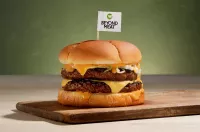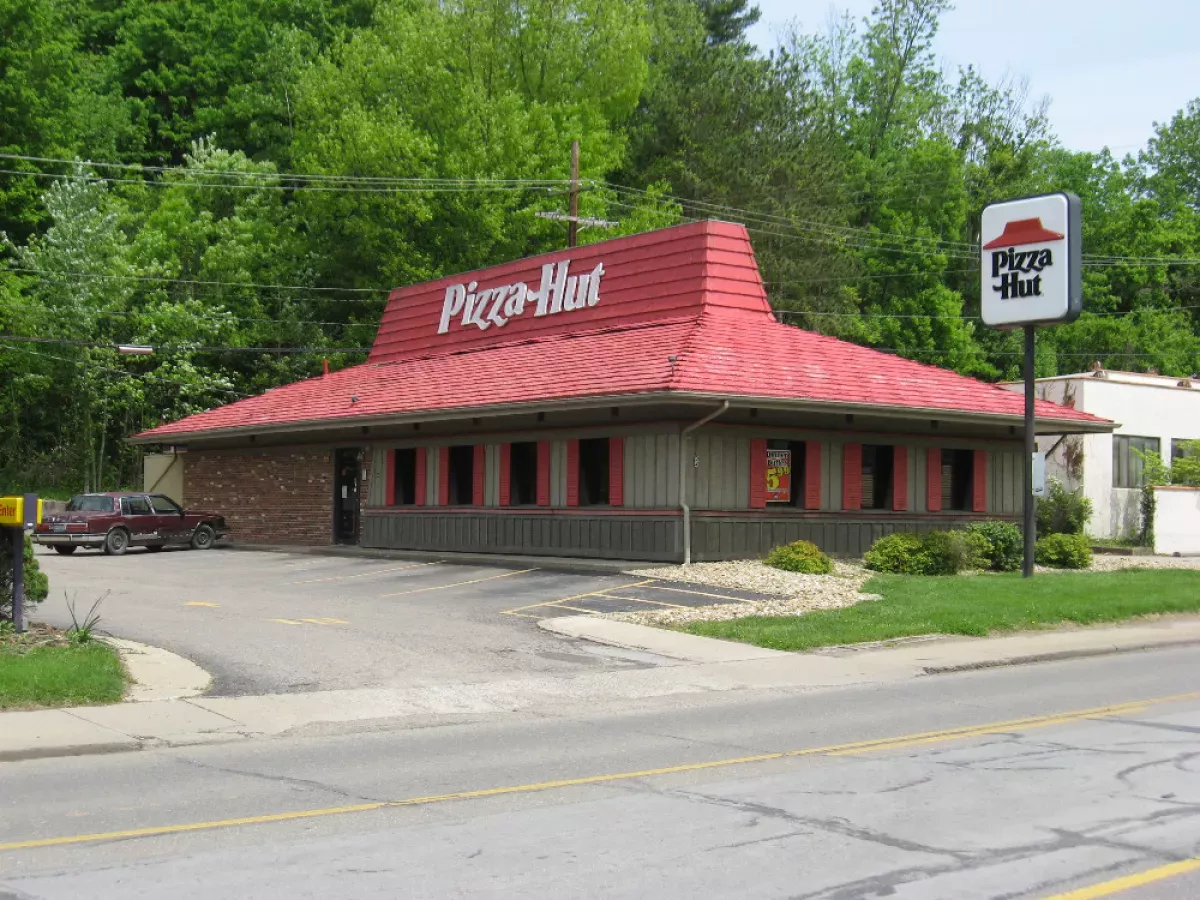Pizza Hut is an American multinational pizza restaurant chain founded in 1958 by brothers Dan and Frank Carney in Wichita, Kansas. Headquartered in Plano, Texas, it operates as an international franchise with 19,866 restaurants globally as of 2023. The company is a significant player in the fast-food pizza sector.
1938: Fair Labor Standards Act of 1938
In July 2014, a class-action lawsuit was filed against Pizza Hut for violating the 1938 Fair Labor Standards Act.
1965: First Television Commercial Produced
In 1965, Pizza Hut's first television commercial, "Putt-Putt to the Pizza Hut," was produced by Bob Walterscheidt.
November 19, 1966: "Putt-Putt to the Pizza Hut" First Aired
On November 19, 1966, the Pizza Hut commercial "Putt-Putt to the Pizza Hut" first aired during halftime of the Notre Dame vs. Michigan State game.
1966: First Restaurant East of the Mississippi
In 1966, the first Pizza Hut restaurant east of the Mississippi River was opened in Athens, Ohio.
1969: Implementation of Building Style
In 1969, the iconic Pizza Hut building style was implemented.
1974: First Pizza Hut in New Zealand
In 1974, the first Pizza Hut store in New Zealand was established in New Lynn by businessman Garry Melville-Smith, who bought the franchise rights for the country.
1975: Testing Applegate's Landing Concept
In 1975, Pizza Hut began testing concepts with Applegate's Landing, restaurants with Colonial-style exteriors and eclectic interiors.
1976: Original Red Roof Design
In 1976, Pizza Hut used the logo and the red roof design that was brought back in 2019.
1984: Book It! Program Conceived
In 1984, the Book It! reading-incentive program was conceived during a dinner with Art Gunther and Bud Gates as a way to help Gunther's son read more.
1987: Advertising slogan "Makin' it great!"
From 1987 to 1995, Pizza Hut's advertising slogan was "Makin' it great!".
1989: Sponsored Film Back to the Future Part II
In 1989, Pizza Hut sponsored the film Back to the Future Part II and offered free "Solar Shades" with pizza purchase.
1990: Pizza Hut Expansion in New Zealand
By 1990, 36 Pizza Hut stores had been established across New Zealand, targeting families with a dine-in restaurant service.
1991: The Pizza Head Show Commercials Aired
In 1991, a series of Pizza Hut commercials titled "The Pizza Head Show" began airing in the US.
August 1994: PizzaNet Pilot Program
In August 1994, Pizza Hut and the Santa Cruz Operation (SCO) announced PizzaNet, a pilot program allowing consumers to order pizza delivery over the internet.
1994: Introduction of PizzaNet
In 1994, Pizza Hut introduced PizzaNet, an early internet ordering experiment.
March 26, 1995: Stuffed Crust Pizza Introduced
On March 26, 1995, Pizza Hut introduced the "stuffed crust" pizza.
1995: Advertising slogan "You'll love the stuff we're made of"
From 1995 to 1999, the advertising slogan was "You'll love the stuff we're made of".
1995: Donald and Ivana Trump Commercial
In 1995, Donald Trump and his ex-wife Ivana Trump appeared in a Pizza Hut commercial.
1995: Introduction of Stuffed Crust Pizza
In 1995, Pizza Hut continued innovation with offerings like stuffed crust pizza.
1995: Celebrity Commercials
In 1995, Ringo Starr and Rush Limbaugh appeared in separate Pizza Hut commercials.
1995: Closure of Applegate's Landing
In late 1995, the last Applegate's Landing restaurant in McPherson, Kansas, closed.
1996: Celebrity Advertising Campaign
In 1996, Formula One driver Damon Hill and BBC commentator Murray Walker advertised Pizza Hut's stuffed crust pizza.
1996: Franchise Sold Back to PepsiCo
In 1996, Garry Melville-Smith sold the New Zealand Pizza Hut franchise back to PepsiCo.
May 30, 1997: Spin-off into Tricon Global Restaurants, Inc.
On May 30, 1997, PepsiCo spun off Pizza Hut, along with Taco Bell and Kentucky Fried Chicken, into a new company named Tricon Global Restaurants, Inc.
1997: PepsiCo Rebrands to Restaurant Brands
In 1997, PepsiCo rebranded the Pizza Hut franchise as Restaurant Brands.
1998: Shift to Takeaway and Delivery Service
In 1998, Pizza Hut transitioned from a dine-in restaurant chain to a takeaway and delivery service due to changing consumer behavior.
1998: Mikhail Gorbachev Commercial
In 1998, former Soviet Union leader Mikhail Gorbachev starred in a Pizza Hut commercial with his granddaughter Anastasia Virganskaya to raise money for the Perestroyka Archives.
1999: Redesign of Logo and Roof
In 1999, Pizza Hut discontinued the logo and the red roof design that was brought back in 2019.
1999: "The Pizza Head Show" Ended
In 1999, Pizza Hut stopped airing "The Pizza Head Show" commercials.
1999: Advertising Slogan: Slogan Ended
In 1999, Pizza Hut stopped using the advertising slogan "You'll love the stuff we're made of".
1999: Big New Yorker Pizza Commercial
In 1999, Pizza Hut's Big New Yorker pizza commercial was featured on the PlayStation Pizza Hut Demo Disc 1, and Pizza Hut was a location in the game Crazy Taxi.
2000: Logo on Russian Rocket
In 2000, Pizza Hut paid for their logo to appear on a Russian Proton rocket, which launched the Russian Zvezda module.
2000: Acquisition of Eagle Boys' New Zealand Operations
In 2000, Restaurant Brands acquired Eagle Boys' New Zealand operations, rebranding them as Pizza Hut stores.
2001: Pizza Delivery to Space
In 2001, Pizza Hut developed a pizza to be delivered to the International Space Station. It was launched on a Soyuz and eaten by Yuri Usachov in orbit.
May 22, 2002: Renamed Yum! Brands
On May 22, 2002, Tricon Global Restaurants, Inc. assumed the name of Yum! Brands.
2002: Spin-off into Yum! Brands
In 2002, Pizza Hut was spun off into Tricon Global Restaurants, Inc., which was later renamed Yum! Brands.
2003: WingStreet Launched
In 2003, Yum! launched WingStreet in combination with existing Pizza Hut franchises.
2004: Number of Traditional Units
As of 2004, there were 6,304 traditional Pizza Hut units with shingled roofs and trapezoidal windows.
2004: Upscale Concept Unveiled
In 2004, Pizza Hut unveiled an upscale concept called Pizza Hut Italian Bistro.
October 2007: Criticism over high salt content in UK
In October 2007, Pizza Hut in the United Kingdom was criticized for the high salt content of its meals.
2007: Criticism of Book It! Program
In 2007, the Campaign for a Commercial-Free Childhood criticized the Book It! program.
2007: Interactive Marketing Initiatives
In early 2007, Pizza Hut implemented interactive marketing strategies using mobile SMS technology, MyHut ordering site, and the "MySpace Ted" campaign.
2007: Advertising Slogan Changed
Until early 2007, Pizza Hut's main advertising slogan was "Gather 'round the good stuff".
April 1, 2008: April Fool's Day "Pasta Hut" Stunt
On April 1, 2008, Pizza Hut in America sent emails and advertised on its website that it was changing its name to "Pasta Hut" as an April Fool's Day publicity stunt.
October 2008: "Pasta Hut" Signage in the UK
In October 2008, Pizza Hut UK recreated the "Pasta Hut" stunt, with ten locations in London temporarily changing their signage, solely as a PR exercise.
2008: Salt Reduction Efforts Begin
Between 2008 and 2010, Pizza Hut started reducing the salt content across its menu to meet the Food Standards Agency 2010 target.
2008: Advertising Slogan Changed
From 2008 to 2009, Pizza Hut's advertising slogan was "Now You're Eating!".
October 27, 2009: "The Natural" Pizza Discontinued
On October 27, 2009, "The Natural" pizza was discontinued in the Dallas market.
2009: Advertising Slogan Changed
From 2009 to 2012, Pizza Hut's advertising slogan was "Your Favorites. Your Pizza Hut".
2010: Salt Levels Reduced
By 2010, Pizza Hut had removed over 15% of salt across its menu to meet the Food Standards Agency 2010 target for salt levels.
2010: Predicted Growth of WingStreet
By 2010, the chain predicted aggressive growth for WingStreet, adding more than 4,000 locations.
2010: Product Placement Removed from Crazy Taxi Re-release
In 2010, the product placement in the re-release of the game Crazy Taxi was removed and replaced with generic locations.
2012: Advertising Slogan Changed
From 2012 to 2016, Pizza Hut's advertising slogan was "Make it great", a variation of the 1987–1995 slogan "Makin' it great!".
July 14, 2014: Opened in Mongolia
"Tavan Bogd Foods Pizza" LLC officially opened Pizza Hut on July 14, 2014, in Mongolia.
July 2014: Class Action Lawsuit Filed
In July 2014, delivery drivers in the United States filed a class-action lawsuit over Pizza Hut "paying delivery drivers net wages below minimum wage due to unreimbursed automobile expenses".
November 19, 2014: Rebranding Announced
On November 19, 2014, Pizza Hut announced a rebrand to increase sales, which included an expanded menu and redesigned employee uniforms.
2014: Report on Traditional Units
In 2014, Curbed.com reported that there were 6,304 traditional Pizza Hut units with shingled roofs and trapezoidal windows as of 2004.
November 2015: Dismissal Attempt Failed
In November 2015, Pizza Hut's attempt to have the class-action lawsuit dismissed failed.
2015: Product Placement in Back to the Future Part II
In 2015, a futuristic version of Pizza Hut's logo appeared in Back to the Future Part II.
2015: Investment in London Branches
In the 2010s, the chain saw a downturn in profits. In 2015, the franchise stated it would be pumping more capital into its London branches. Pizza Hut is installing cocktail bars in its London branches.
February 2016: Demolition of Original Dine-In Restaurant
In February 2016, the original New Lynn dine-in Pizza Hut restaurant was demolished and replaced with a takeaway store.
December 2016: Lawsuit Decided by Arbitration
In December 2016, the case, Linkovich v. Capital Pizza Huts, Inc., et al., was decided by arbitration, in which Pizza Hut paid damages.
2017: Ranked in Top Influential Brands
In 2017, Pizza Hut was listed as the 24th most influential brand in the world by Richtopia.
August 2018: 324 Franchises in South Korea
As of August 2018, Pizza Hut had 324 franchises in South Korea.
January 2019: Expanded Beer Delivery
In January 2019, Pizza Hut announced it had expanded beer delivery to 300 locations across the US., with plans to expand to 1,000 locations by the middle of the year.
March 2019: Return of the P'Zone
In March 2019, Pizza Hut announced the return of the P'Zone after a hiatus of several years.
June 25, 2019: Logo and Red Roof Return
On June 25, 2019, Pizza Hut announced it was bringing back the logo and the red roof design used from 1976 until 1999.
August 7, 2019: Restaurant Closures Announced
On August 7, 2019, Pizza Hut announced its intention to close about 500 dine-in restaurants in the US by the middle of 2021.
August 18, 2020: Restaurant Closures Due to Bankruptcy
On August 18, 2020, Pizza Hut announced it would be closing up to 300 restaurants after the bankruptcy of NPC International.
March 2021: Flynn Restaurant Group Acquisition
In March 2021, Flynn Restaurant Group acquired NPC's 937 Pizza Hut locations.
2021: Stuffed Crust Pizza Anniversary
A 2021 menu addition, designed to commemorate the 25th anniversary of the introduction of stuffed crust pizza, was "nothing but the stuffed crust," a ring of dough filled with cheese.
2021: Target Date for Restaurant Closures
By the middle of 2021, Pizza Hut planned to close about 500 of its dine-in restaurants in the US.
2023: Beyond Meat Pepperoni added to UK Pizza Hut menus
In 2023, UK Pizza Hut restaurants added Beyond Meat Pepperoni to its menus with pizzas that include the Big New Yorker with vegan cheese and Beyond Pepperoni.
May 2024: Penalty for Spam Messages
In May 2024, Australian franchisee Pizza Pan Group was penalized with a AU$2.5 million fine for sending 10 million marketing spam messages over four months.
June 2024: All You Can Eat Lunch Buffet Returns
In June 2024, some Pizza Hut locations reportedly brought back the all you can eat lunch buffet.
September 2024: 50th Anniversary Celebration
In late September 2024, Pizza Hut celebrated the 50th anniversary of its establishment in New Zealand with pop-up lunch, dinner buffet, and dessert events in Auckland.
2024: Documentary about former Pizza Huts released
The documentary film Slice of Life: The American Dream. In Former Pizza Huts, directed by Matthew Salleh, was released in 2024.
Mentioned in this timeline

Beyond Meat Inc founded in by Ethan Brown and branded...

Donald John Trump is an American politician media personality and...
PlayStation is a video game brand by Sony Interactive Entertainment...
Xbox is a video gaming brand owned by Microsoft Gaming...
Hong Kong is a densely populated special administrative region of...
China officially the People's Republic of China is an East...
Trending

4 minutes ago Hilary Duff releases 'Luck... or Something,' addresses rumors, and discusses sister relationship.

18 hours ago Haley Winn's brothers gain viral fame supporting her at the Olympics with unique outfits.
1 hour ago Maryland and Virginia Brace for Heavy Snow Risk This Weekend Amidst Uncertainty
1 hour ago CBS supports Leah Lewis, upholding David Del Rio's 'Matlock' firing after investigation.
3 hours ago Iowa Schools Delay, Cancel Classes Due to Winter Storm and Snow Forecast

4 hours ago Trump Considers Iran Options: Targeted Attacks, Regime Change, Amidst Growing US Military Buildup.
Popular

Jesse Jackson is an American civil rights activist politician and...
Randall Adam Fine is an American politician a Republican who...

Pam Bondi is an American attorney lobbyist and politician currently...

Ken Paxton is an American politician and lawyer serving as...

Bernie Sanders is a prominent American politician currently serving as...

Barack Obama the th U S President - was the...
